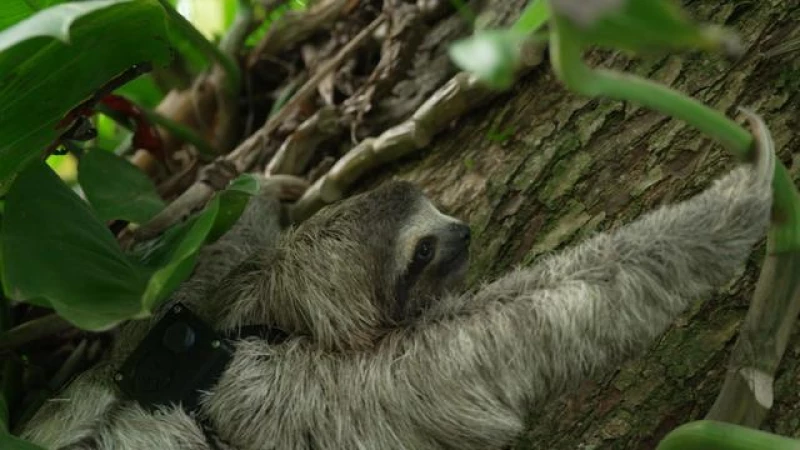This is an updated version of a story first published on Sept. 24, 2023. The original video can be viewed here.
How Sloths Survive: An Updated Story
Discover the fascinating world of sloths and their incredible survival strategies. Originally published on Sept. 24, 2023, this updated version delves deeper into the secrets behind these slow-moving creatures.
Watch the original video here.
The first thing we learned about sloths is that it's hard to spot them in the wild. We were warned to keep our eyes on the ground for poisonous snakes…as we scanned the treetops. The sloth is a master of disguise. It blends into the canopy and can easily be mistaken for a tuft of leaves.
We tend to hunker down when it rains…so making it even harder to see us...
Our luck improved on the beach.
Oh-oh! there's one up there. She--she's in the nook of the tree looking a bit like a termite hump. And she's hunched over, so what we're looking at is her back.
That is not the side of the sloth we went all the way to Central America to see. So we took you to an animal sanctuary to get a better view of the two species of sloth that live here: the bradypus...and the two toed…
So the two-toed I always say looks like a cross between a Wookiee and a pig. (laughs) 'Cause they've got that sort of beep-able nose. And then these ones have the sort of, you know, Beatles haircuts and-- and Mona Lisa smiles.
Behind that ringer for Ringo, we have a secret. Being nature's couch potato is the reason sloths have survived for more than 60 million years in spite, of, well, themselves.
Our eyesight is lousy - our hearing not much better.
Sloths: The Hairy Ninjas of the Animal Kingdom
In a tree they can move like a tai chi master…to avoid the eyes of hungry birds of prey.
But on the ground, it seems gravity removes any shred of dignity. Even with a hurricane strength tailwind, a sloth will top out at a half mile per hour.
According to wildlife expert Lucy Cooke, the early explorers who first encountered sloths had a hard time understanding these creatures. The conquistadors described them in terrible ways, with one even calling them the stupidest animal he had ever seen. However, as Cooke explains, the sloth's unique characteristics make it perfectly adapted for survival.
When asked why sloths move so slowly, Cooke explains that it's all about energy conservation. Sloths are vegetarians, and just like antelope, leaves don't want to be eaten. To protect themselves, leaves create toxins. Sloths can digest these toxins, but only at a very slow pace. By moving slowly and burning as little energy as possible, sloths are able to survive in their environment.
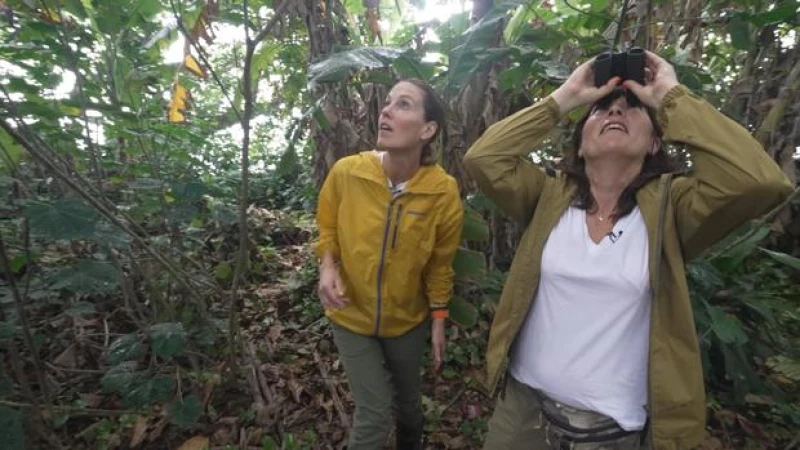
Sloths, known for their solitary nature and slow movements, have some interesting habits. They spend about 90% of their lives hanging upside down and only come down to the ground for bathroom breaks, which they do once a week. However, when it comes to mating, female sloths take a different approach. According to wildlife expert Lucy Cooke, female sloths climb to the top of a tree when they're in heat and scream for sex. The screams, which are in the key of D sharp, serve as a mating call for male sloths. Cooke even demonstrated the sound, hoping to attract a male sloth named Teddy. After mating, both male and female sloths retreat and have a long snooze.
Lucy Cooke, known for her expertise in sloths, has an impressive background. She holds a master's degree from Oxford and has published four books, two of which are about sloths. Cooke has also hosted wildlife programs for the BBC and National Geographic. Her photographs from her expeditions have gained viral attention, leading to donations for conservation efforts. In addition, her lectures, which combine biology with stand-up comedy, have attracted large crowds.
Lucy Cooke: A Fascination with Unconventional Animals
During a recent Ted Talk, Lucy Cooke shared her thoughts on humanity's obsession with speed and the beauty of unconventional animals. Cooke, known for her love of "B-list animals," expressed her admiration for creatures like bats and hyenas.
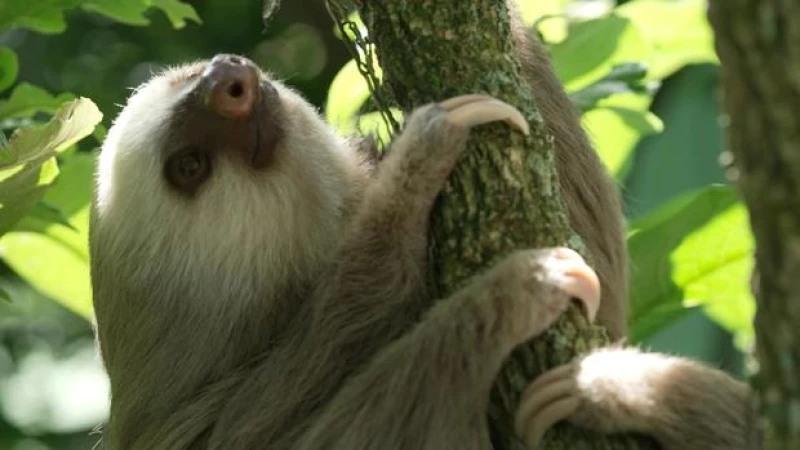
While exploring the Costa Rican rainforest, Cooke stumbled upon a remarkable discovery. She came across a cluster of fluffy golf balls, which turned out to be the elusive Caribbean white tent-making bats. This encounter left Cooke starstruck and further reinforced her belief in the wonders of the animal kingdom.
Lucy Cooke: The Astonishing World of White Bats
Witnessing the sight of white bats living in leaves has left Lucy Cooke in awe. Her heart rate rises, she sweats, and she may even shed tears. The marvel of their existence is a testament to the miracle of evolution. The question of "why?" lingers in her mind.
Lucy Cooke's unique perspective, akin to that of sloths, has made her a passionate advocate for these creatures. Her latest book, humorously titled "Bitch," showcases her unconventional outlook.
During an interview with Sharyn Alfonsi, Cooke explains how Charles Darwin, her personal hero, portrayed females in a stereotypical Victorian manner. She challenges this image, emphasizing that women were often overlooked in the grand narrative of evolution.
When asked if her views can be considered "biological wokeness," Cooke offers a thought-provoking response.
Lucy Cooke believes in challenging conventional wisdom. She argues that animals like the female spotted hyena are not passive and coy, but rather fierce and bold. She shares that if you ask a hyena if she's passive, she'll laugh in your face after biting it off.
While Cooke is known for her work in improving the reputation of sloths, she also wants to shed light on a more somber issue. She takes us to the Toucan Rescue Ranch near Costa Rica's capital, San Jose, where sloths are brought after being injured by power lines.
Lesley Howle, an occupational therapist, started the ranch 19 years ago. She now has a team of six veterinarians who treat the electrical burns suffered by the sloths. Despite millions of years of evolution, the sloths are not prepared for the encroachment of human civilization. However, the vets believe that the sloths' slow metabolism somehow allows them to recover from injuries that would be fatal to other animals. The Toucan Rescue Ranch also takes in orphaned sloths.
Among the sloths at the ranch are Gio, Marilyn, and Landon, who are being cared for by the dedicated team at the ranch.
Recreated News
Lesley Howle: And-- he's a toddler.
Lesley Howle: And this is our tiniest, little Benji.
Sharyn Alfonsi: OK, now my ovaries have cracked. (laughs)
It can take up to two years for the orphans to be ready to go back into the wild. We watched as a female named Nosara was prepared for release. She was given a final checkup and a tracking collar before getting a lift to a promising tree.
Lucy Cooke: Off she goes.
Sharyn Alfonsi: And if she falls asleep in the middle of the release, (laughs) is that a bad thing?
Lesley Howle: There she goes.
Voices: Oh. Ooh.
Lucy Cooke: That's a scary moment isn't it?
Voices: Oh. Phew.
Sharyn Alfonsi: Mission impossible has nothing on this, like…
With that high drama behind us, we headed down the Caribbean coast with Lucy Cooke to visit another British scientist.
Becky Cliffe is conducting the first population study of sloths, ever. That might seem like low hanging fruit… it is not.
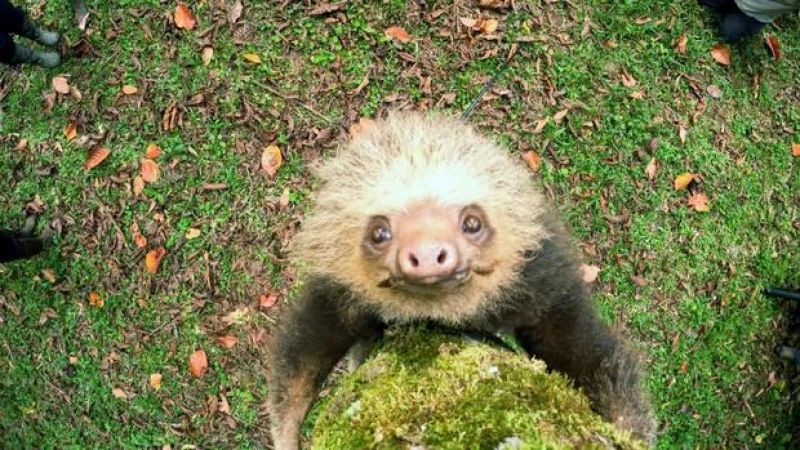
Sharyn Alfonsi: Why is it so hard to get scientific data on sloths?
Sloths in Costa Rica Facing Challenges from Climate Change
They've evolved over the last 64 million years to be masters of disguise, right? They are so good at pretending to be coconuts and bird nests, then they're hiding from the very people who are trying to-- trying to help them.
Neither of the sloth species in Costa Rica is officially considered endangered. But some are suffering from an illness that may be related to climate change.
We're getting extreme periods of hot dry weather, and then extreme periods-- of prolonged cold and rain. And that is not what sloths have evolved to survive in. What we're discovering is that the microbes in the sloth's stomach that they use to digest the leaves they eat, when the sloth gets too cold, those microbes die. So even though the sloth might be eating and looking well, it's not digesting its food properly. So they're losing energy and they're getting very weak.
It sounds like they're starving to death but with a full stomach.
That's exactly it. It's a really strange phenomenon that I think only happens in sloths. But it's happening here.
For Cliffe to collect data – she has to collect sloths. That's the full time job for her colleague, Dayber Leon. He climbed barefoot up a three-story high tree covered in biting ants, snatching the sloth, then lowering it in a bag.
Lucy Cooke: Come on little one. Hi
Sharyn Alfonsi: That's impressive. So do you have to do that every time you want to get a sloth down?
Lucy Cooke: And this is easy, yeah. (laughs)
The stuffed sloth she is holding is not a gimmick. It was used to comfort the real one, as we helped replace a memory chip in a tiny backpack the sloth wears.
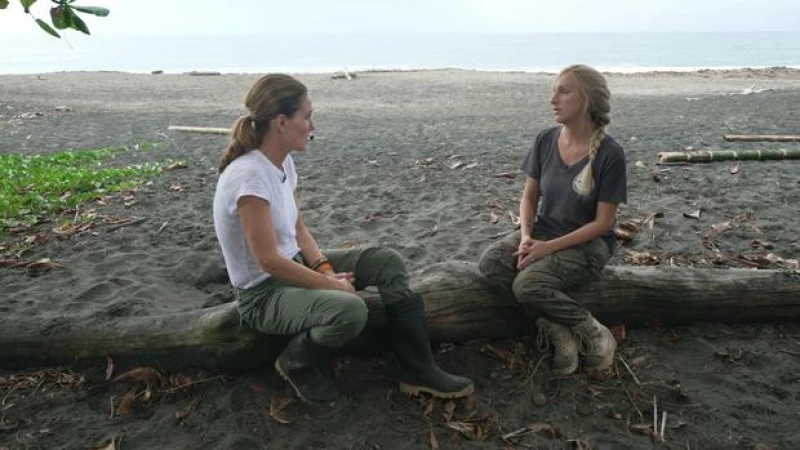
Sharyn Alfonsi: Oh, you're very strong
Becky Cliffe: Very strong. And then lean her back a little bit. Come on, sweetie.
Sharyn Alfonsi: Gosh, this is like dressing a baby.
Lucy Cooke: Done. Wam-bam.
Sharyn Alfonsi: What kind of information does this give you?
Becky Cliffe: We collect a lot of-- manual data, in terms of what type of tree she's in, how high in the tree she is. There's also a data logger inside here, which collects a lot of information about her behavior. So even her micro body movements are being recorded inside there.
Lucy Cooke: Here we go. Yeah, that's a girl.
Slow and Sustainable: Sloths to be Returned to the Wild
Thirty two sloths will receive backpacks and be reintroduced to their natural habitat at a gradual pace. A study led by Lucy Cooke aims to provide a deeper understanding of these animals, challenging the quick judgments often made about them.
In an interview with Sharyn Alfonsi, Lucy Cooke explains the lessons we can learn from sloths. She emphasizes the importance of adopting a slower and more sustainable lifestyle, as our fast-paced and convenience-driven habits contribute to the alarming rate at which we are destroying the planet. By taking inspiration from the sloth's deliberate and mindful approach to life, Cooke believes that we can help save the planet and protect its diverse array of species.
Produced by Guy Campanile. Associate producer, Lucy Hatcher. Broadcast associate, Elizabeth Germino. Edited by Craig Crawford.

